|
Gablonz to NewGablonz: The Emil Hubner and Sohn Story ~ 1820 - 2012
It was 1945, and the Germans had just lost the war. The new Czechoslovakian government, under the terms of the Benes agreement hashed out by Stalin, Churchill and Roosevelt, started to evict the Suduten Deutsch from the country. They had 48 hours to pack 40 kilo’s of belongings per family and leave the country.
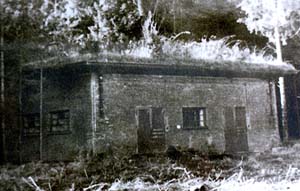 Due to the foresight of one man, Erich Huschka, who was a radio operator during the war on the German side, (and a draftee selected from amongst the Suduten Deutsch living in Gablonz, Bohemia), he convinced the Suduten refugees of Gablonz involved in the glass industry to settle in a bunker complex not damaged by the Allied bombing in an area next to Kaufbeuren in Bavaria. He named it “NeuGablonz”. Working with the Allied governments and the new West German government, Huschka was able to negotiate the empty bunkers to refugee glass bead makers. Marshall plan funds were involved. Due to the foresight of one man, Erich Huschka, who was a radio operator during the war on the German side, (and a draftee selected from amongst the Suduten Deutsch living in Gablonz, Bohemia), he convinced the Suduten refugees of Gablonz involved in the glass industry to settle in a bunker complex not damaged by the Allied bombing in an area next to Kaufbeuren in Bavaria. He named it “NeuGablonz”. Working with the Allied governments and the new West German government, Huschka was able to negotiate the empty bunkers to refugee glass bead makers. Marshall plan funds were involved.
The original old bunker
building.
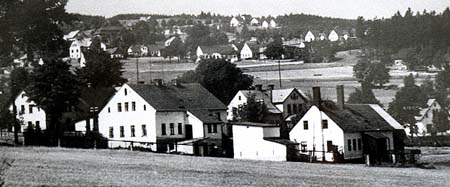 One of the first bunkers was issued to Emil Hubner and family as the building to be transformed into the glass bead-making factory of Emil Hubner and Sohn, in 1946. One of the first bunkers was issued to Emil Hubner and family as the building to be transformed into the glass bead-making factory of Emil Hubner and Sohn, in 1946.
Gistei House #44
Ernst Emil Hubner formed Emil Hubner and Sohn as a corporation back in 1860. The company was located in a tiny village outside of Gablonz in house #44. The village was called Gistei. According to Uta Preis, the current Director of Emil Hubner and Sohn in NeuGablonz, the first ancestor of the family to start making lampwork beads was in the 1820’s. (Joachim Hubner, born 1801).
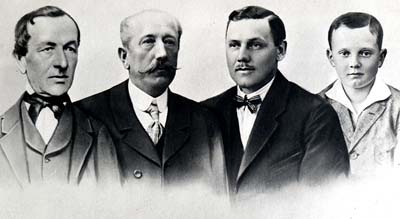 The Emil Hubner Gentlemen- the 4 Directors The Emil Hubner Gentlemen- the 4 Directors
In 1946 the Hubner’s were targeted to be deported. Uta Preis was two years old, and along with her mother began the trek to Kaufburen. They had a handcart with 40 kilos of belongings, and a long journey before them. They arrived in Kaufburen along with Uta’s grandparents, and were assigned housing in a small village outside of Kaufburen. On the same day they arrived, Uta’s father arrived by train from Northern Germany where he had been held in a prisoner of war camp run by the British. The grandfather, Emil Hubner, and Uta’s father Joseph Hubner took possession of the bunker and began producing beads. Actually, the first item they produced was a 4 hole sew through button for the clothing trade. Germany was desperate for buttons. 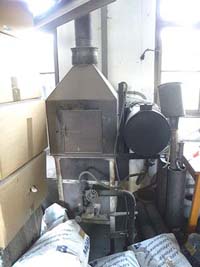
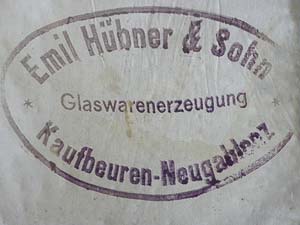 Sack of beads. Sack of beads.
Glass furnace.
In 1947 Uta’s mother connected with a smuggler whom she paid to guide her over the West German border into Czechoslovakia so she could return to their former house at 44 Gistei to attempt to recover some more of their belongs they had been forced to leave behind. When they reached Prague the smuggler gave the group 48 hours to get to their destination and return so he could smuggle them back into West Germany. Uta’s mother was able to reach her old house and make contact with the occupiers of the house.
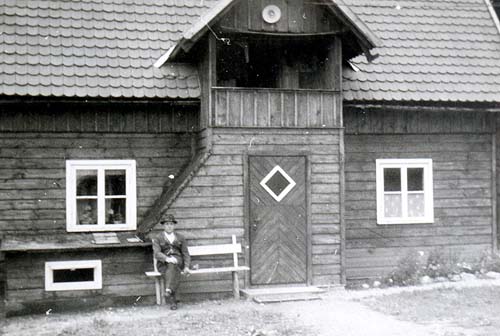
Front door of factory.
The man, Miroslav Masecha, had been a worker in the Emil Hubner factory, and had been appointed as the Administrator of the house by the Czechoslovakian government. He and his family had moved in, taking possession of the property and all its contents. His daughter Hanna greeted Uta’s mother with open arms, grateful she and Uta had survived the long march to Kaufburen. She gave Uta’s mother a very expensive plate, a very expensive camera and some material for making a business suit, which had previously belonged to the Hubner family, and Uta’s mother rushed back to Prague. She met up with the smuggler and made it back safely to Kaufburen. The plate was traded for a military jeep – the first private vehicle in the new town of NeuGablonz. The Hubner’s were on the way to recovery. Emil Hubner and Sohn grew to become the first and largest fire polish and pressed glass bead factory in NeuGablonz.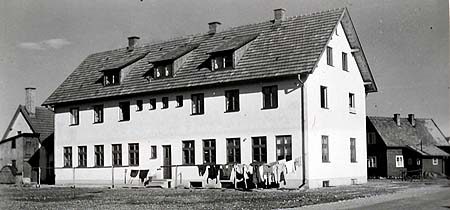
In 1984 while on vacation in Austria, Uta received a phone call from her mother that her father, Joseph Hubner, had been caught up in some of the bead machinery and was killed. She rushed back and took over the reins of the company, giving up her career as a teacher.
The Factory Building
Uta ran the company for 8 years alone; when her husband Werner retired as an engineer in the concrete business to join her he worked for another 8 years before retiring again.
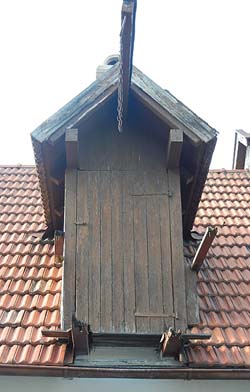
At the height of their business Emil Hubner and Sohn had 42 pressers working full time producing glass beads, faceting and fire polishing; as well as producing plastic (Lucite) beads and bangles which they started in the 1970’s, as that had become all the rage.
The crane and door where the beads or glass was brought in.
According to Uta, most of the glass bead factories threw out or sold off their glass bead machinery and switched to plastic injection mold equipment. Emil Hubner just stored their machinery in the attic in case it was needed later, and begun producing plastic beads.
According to Uta, at its height NeuGablonz had over 2,000 bead makers or related manufacturers scattered around town. Some were large like Emil Hubner and Sohn, others were cottage industry businesses with one family member coating beads or cutting glass or fire polishing. Almost every house was involved in the bead business.
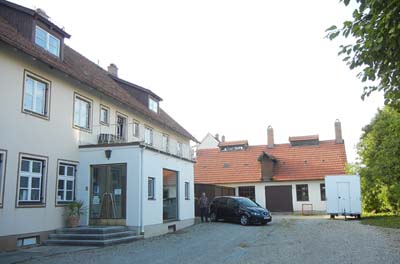 Factory and warehouse in 2013. Factory and warehouse in 2013.
Uta remembers growing up within the Emil Hubner business, where all her grandparents and parents talked about was business; both old business in Gablonz and new business in NeuGablonz, probably because they had had it all and then lost it all. All their energy had gone into rebuilding.
Uta talks about NeuGablonz today; how almost no bead businesses are in existence, and that the Gablonzer Industries which is a trade organization founded to promote beads and jewelry in NeuGablonz is now more interested in electronic and technical industries and manufacturing than in beads. And the town is full of old people. All the young blood is leaving to pursue careers in other hi-tech, computer industries. What are coming in now are Turkish emigrants with no hope of employment. The young people are forming gangs and hanging out on street corners; getting in trouble with the police
The other interesting development Uta has noticed is the influx of ethnic Germans emigrating to NeuGablonz from Russia since the fall of the Soviet Union in 1990. They are being pushed out of the old Soviet Republics in a similar manner as the Suduten Deutsch of 1946. The older Germans speak an old world German with subservient behavior towards the current residents such as bowing and cringing and hand wringing as if still living in the 19th century in a hostile country. On the street the youth speak Russian and form gangs to compete and aggressively defend themselves against the Turkish gangs.
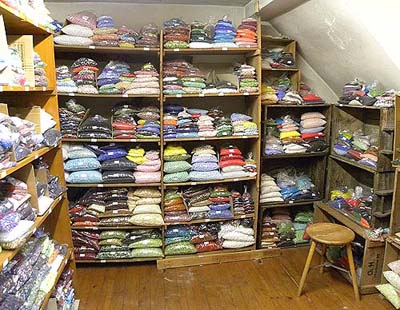 Various glass beads. Various glass beads.
Uta is attempting to sell her factory, machinery, molds, tools and the entire inventory. Once it is all sold, she will sell the building, and the house, which adjoins the factory building, and leave the area. It is too depressing to see a once prosperous and vibrant industry fade away to nothing. She doesn’t want to be the last one to turn off the lights. Over the years the business had started to decline, and the 42 pressers and faceters started to drift away.
Rods of glass.
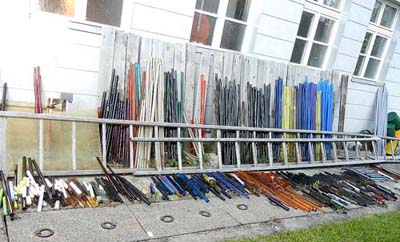
The last presser retired in 2010, leaving Uta to work alone in her large, four-story factory. Her mother had refused to attend trade shows in fear that competitors would steal her designs and ideas.
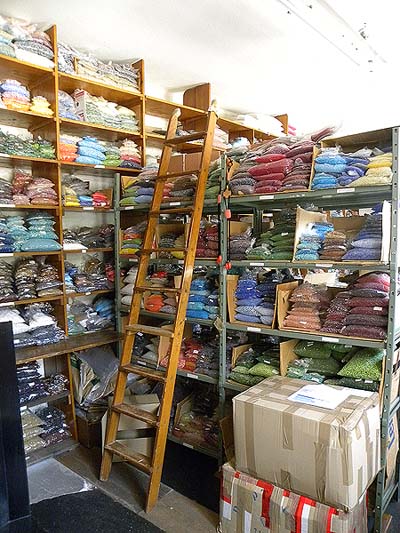
German warehouse, glass beads.
Only once Uta took over the company did she attend trade shows and begin advertising. But it was too late. Her customers had drifted over to the Czech Republic to buy from the newly freed bead factories no longer restricted by Jablonex’s monopoly. Then the German entry into the European Union and the replacement of the Deutschmark for the Euro dollar. German beads became too expensive. The final blow was the entry of China into the glass bead market.
Emil Hubner and Sohn closed its doors in 2012, after one last trade show at the Perlen Poesie bead show in Hamburg, represented by Wild Things Beads.
Wild Things Beads is also representing Emil Hubner and Sohn in the sale of their factory.
After our interview with Uta and Werner Preis, who hosted our stay in NeuGablonz in their beautiful house; taking good care of our needs, driving us around the town pointing out existing bead and jewelry businesses, old unused bunkers from the war kept in original condition as a reminder of the towns early beginnings, and providing a tour of the bead museum, we drove back to Jablonec nad Nisou (Gablonz) in the Czech Republic and found her old house and business at 44 Gistei. Now the town is called Jistersky. We knocked on the door and met with the daughter of Hanna. She and her daughter still occupy the property. She spoke no English, but knew we were looking for the old Hubner house and was able to show us the old #44 plate in the window as well as a photo of Hanna as an old woman. She told us Hanna had passed away eight months ago. It turns out Uta’s mother had kept in contact with Hanna during all the years since 1947. We gave Uta an update when we returned home.
Uta, up until now, has had no interest in visiting Jablonec and surrounding area, whereas Werner, who was born in Rochlitz (now Rokythice nad Jizerou, a town about 30 km away which specialized in handmade lace), has wanted to visit the area for a long time. Now they are very interested in going back.
All Rights Reserved ~ Copyright April 2013
This article cannot be reproduced in part or full without the written permission of Wild Things Beads.
~~~~~~~~~~~~~~~~~~~~~~~~~~~~~~~~~~~~~~~~~~~~~~~~~~~~~~~~~~~~~
J-Me and Guy are the owners of Wild Things Beads, a small family run import business specializing in Czech glass beads and buttons. They also run working bead tours to Jablonec and Hong Kong. Their warehouse is located deep in the Sierra Nevada foothills of Northern California, and can be reached by phone at (530)743 1339 or on the web at www.wildthingsbeads.com. They are also open by appointment at their warehouse.
   |